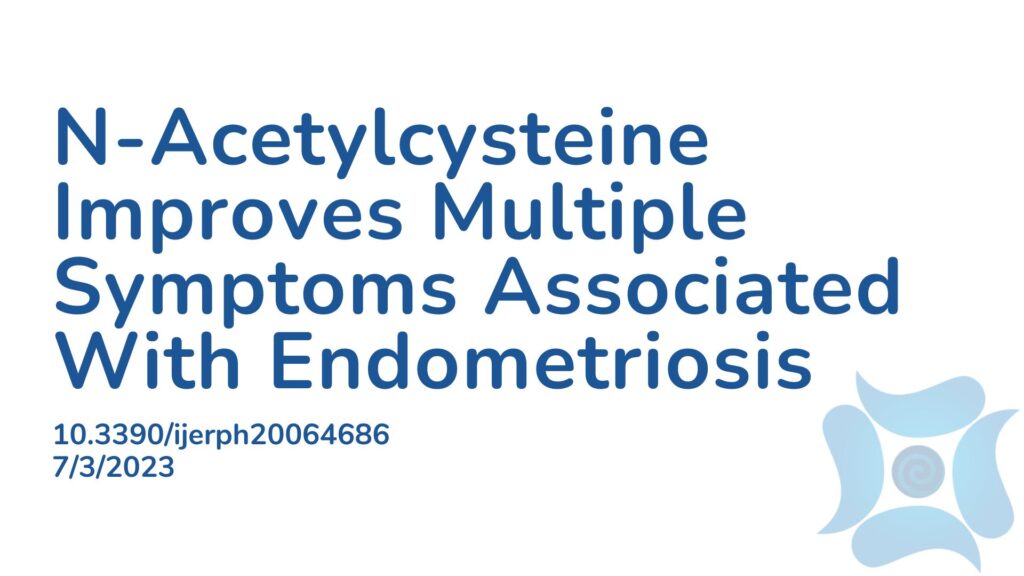Summary:
Endometriosis is a chronic inflammatory disease that affects up to 10% of women. It is characterized by deposits of tissue that develop outside the uterus which can cause significant pain during menstruation and sexual intercourse. Endometriosis is also associated with infertility in up to 50% of cases. The pathogenesis of endometriosis is not definitively understood, however environmental, dietary, genetic and immune factors are thought to be involved. The presence of endocrine disruptors in an individual’s system such as dioxins and bisphenol A also have been shown to increase the risk of developing endometriosis. There has been preliminary evidence to suggest that N-Acetylcysteine (NAC) may be efficacious in endometriosis, however the purpose of this study was to confirm this effectiveness in reducing endometriosis-related pain and the size of endometrium tissue. The secondary objective was to assess if NAC may play a role in improving fertility and reducing Ca125 serum levels, which is an indicator of tumours related to the ovaries. Patients aged between 18-45 who have a clinical diagnosis of endometriosis and are receiving no treatment for it were included in the study. The patients received 600mg of oral NAC 3 days per week, for 3 months. The results showed that the intensity of painful menstruation, sexual intercourse and pelvic pain significantly improved. The use of non-steroidal anti-inflammatory drugs, the size of the deposits of tissue and the serum levels of Ca125 significantly decreased. Of the 52 patients recruited for this study that had an intention to fall pregnant, 39 successfully achieved pregnancy within 6 months of starting the NAC treatment. The researchers therefore concluded that oral NAC improves endometriosis-related pain, decreases Ca125 serum levels and can improve fertility in people with endometriosis.
Abstract:
Background: Endometriosis is a chronic, estrogen-dependent, inflammatory disease, whose pivotal symptoms are dysmenorrhea, dyspareunia, and chronic pelvic pain (CPP). Besides the usual medical treatments, recent evidence suggests there are potential benefits of oral N-acetylcysteine (NAC) on endometriotic lesions and pain. The primary objective of this prospective single-cohort study was to confirm the effectiveness of NAC in reducing endometriosis-related pain and the size of ovarian endometriomas. The secondary objective was to assess if NAC may play a role in improving fertility and reducing the Ca125 serum levels. Methods: Patients aged between 18–45 years old with a clinical/histological diagnosis of endometriosis and no current hormonal treatment or pregnancy were included in the study. All patients received quarterly oral NAC 600 mg, 3 tablets/day for 3 consecutive days of the week for 3 months. At baseline and after 3 months, dysmenorrhea, dyspareunia and CPP were assessed using the Visual Analog Scale score (VAS), while the size of the endometriomas was estimated through a transvaginal ultrasound. Analgesics (NSAIDs) intake, the serum levels of Ca125 and the desire for pregnancy were also investigated. Finally, the pregnancy rate of patients with reproductive desire was evaluated. Results: One hundred and twenty patients were recruited. The intensity of dysmenorrhea, dyspareunia and CPP significantly improved (p < 0.0001). The use of NSAIDs (p = 0.001), the size of the endometriomas (p < 0.0001) and the serum levels of Ca125 (p < 0.0001) significantly decreased. Among the 52 patients with reproductive desire, 39 successfully achieved pregnancy within 6 months of starting therapy (p = 0.001). Conclusions: Oral NAC improves endometriosis-related pain and the size of endometriomas. Furthermore, it decreases Ca125 serum levels and may improve fertility in patients with endometriosis.
Article Publication Date: 7/3/2023
DOI: 10.3390/ijerph20064686



